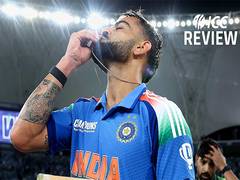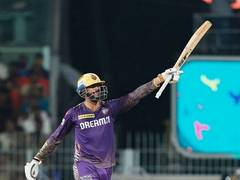A foot in futsal: Indian women ready for crack at history
Bhavnagar (Gujarat) [India], December 24 (ANI): The Indian national women’s futsal camp, in preparation for next month’s AFC Women’s Futsal Asian Cup Qualifiers, is in full swing in Bhavnagar, Gujarat. The year 2025 will bring a new dawn in Indian futsal as the qualifiers will mark the nation’s competitive debut in the women’s game.
Less than two years ago, the Indian men’s futsal team debuted in the AFC Futsal Asian Cup Qualifiers in Tajikistan. Despite losing all three games, India gave a decent account of themselves, scoring 10 goals and playing dynamic and fast-paced futsal. The head coach was Joshuah Stan Vaz, who will also be in charge of leading the women’s side in their international debut. India will face Hong Kong (January 15), Indonesia (January 17) and Kyrgyz Republic (January 19) in Yogyakarta, Indonesia.
From more than a hundred players who attended the selection trials in early November, the squad has been trimmed to 18 players currently in the final phase of preparation. The first phase of the camp ended on November 25 and the second began on December 15.
Speaking to the-aiff.com from the Bhavnagar camp, head coach Vaz shared, “We had given the girls a fitness programme during the break between the camps. They have come back in quite good shape. They have kept their fitness. We have been working on our tactics, basically the system that we want to play in the tournament. Attacking and also defending. We are also working on set pieces. This is what we have covered in the first week of the second phase, but there is a lot more work to do in the next two-and-a-half weeks until the tournament.”
Many of the campers, primarily football players, did not have prior experience of competitive futsal and have had to adjust to playing on the hard indoor courts. However, Vaz is glad with how they have grasped the sport in such little time and are doing better than he had initially expected.
“I was a bit sceptical at the start but the girls have actually proven me wrong in many ways. They have adapted to certain tactics that I thought would be difficult for them. But they are learning and improving every day. They have good grasping power. It was a bit difficult for them to come from football to futsal. Here, it’s a hard court. We are training on a wooden surface. The ball also moves faster, unlike football on a grass ground. So it took them a few days to adapt, but they have adapted well to the current scene.
“We had to start from scratch because even though a few of the girls have played futsal, it was not the correct form of futsal. The rules, the system had to be taught to them from scratch. It’s a blank paper and they are learning to draw. But as I said, they have adapted well to the tactics. They have started to understand. There is a long way to go. Obviously, I cannot teach them everything in three weeks. But we’re touching upon all important things. The way of scoring goals, defending well, and not conceding,” said Vaz.
The top two teams from each group and the best third-placed team among all five groups will qualify for the AFC Women’s Futsal Asian Cup to be hosted by China in May 2025. That’s not out of reach for India, according to Vaz. His girls will go up against experienced teams in their debut tournament, but the ultimate goal will be to get a ticket to China.
“We don’t have experience at the international level. The girls have never played an international match or a friendly against an international opponent. So the first match will be crucial for them to understand the level that is required. But definitely, we are going there to compete, not to make the numbers. Our goal is to qualify for the main tournament in China in May 2025.”
One-on-one skills, set-pieces, and most importantly, small details, are the main points of focus for Vaz as he aims to build a competitive side.
“As a coach, I’ve already told my players that we cannot get beaten one-on-one. The modern trend in futsal at the moment is one versus one. Since it’s a smaller space and five versus five. If one person gets beaten, it’s a numerical disadvantage to the team. And vice versa – if you beat your opponent, it’s a numerical advantage to your team to go ahead and score a goal.
“Our focus is on the small details in each system. The small details are what matters, not the bigger picture. Like the individual responsibility of the player. Two-player combinations, their responsibilities together. The role of the goalkeeper. And I’m sure once they know the small details, they will be able to put it all together into the bigger picture,” said Vaz.
Leading the Indian national teams of both genders in their debut tournaments labels Vaz as a pioneer of the sport in the country. While that’s something the 34-year-old is proud of, he credits his father, Socorro Vaz, who established the Youth Futsal Academy in Margao, Goa, in 2012, for creating the pathway for futsal in India.
“Of course, it (coaching the national teams) is a very proud moment for me and my family. Actually, my dad is the pioneer of futsal. I’m just carrying on the thoughts he had started with. He did the first ever Futsal Level 1 coaching course in India in 2011. Next year he started YFA, an exclusive futsal academy. So, it was his vision I’m carrying forward.
“I’m very passionate about this game and about coaching. Every time I step into the role of a coach or a coach educator, I give my hundred per cent. I think without a challenge, life would be very boring. So I’ve taken up this challenge. I try to give the girls all the knowledge I have. I have great staff with me – my assistant coach, Judon (Dsouza) and goalkeeper coach, Veera (Babu Sivaneni).
“Futsal isn’t there to compete with football. It’s an auxiliary to it, which helps to create better Indian football players. That’s what European, South American and top Asian countries are doing at the moment,” said Vaz.






